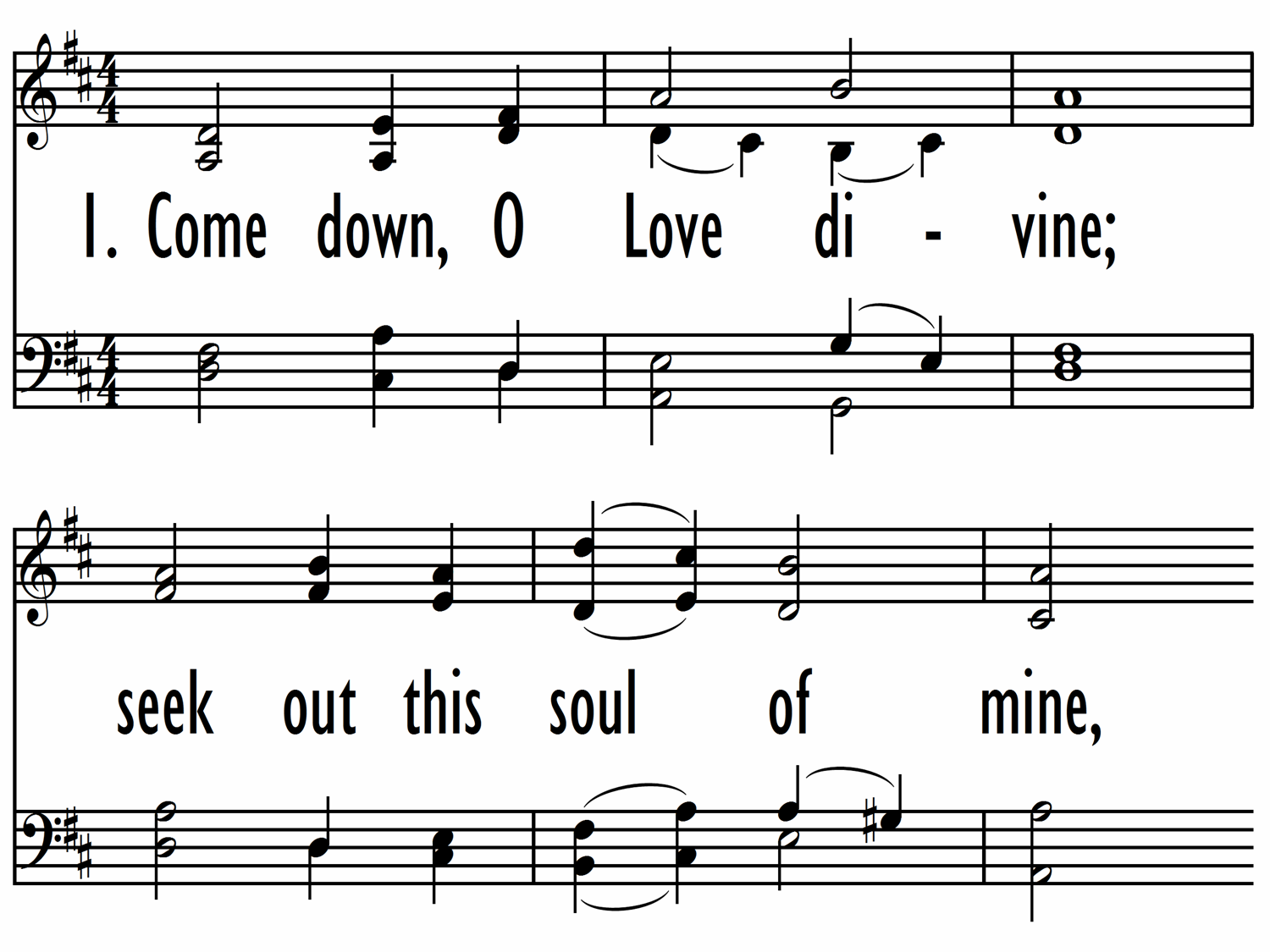- |
User Links
Come Down, O Love Divine
Hymn Information
- First Line
- Come down, O Love divine
- Author
- Bianco da Siena, ca. 1350-1434
- Translator
- Richard F. Littledale, 1833-1890
- Tune Name
- DOWN AMPNEY
- Composer
- Ralph Vaughan Williams, 1872-1958
- Topic
- Holy Spirit · Church Year: Pentecost
Copyright Information
- Text Copyright
- Public Domain
- Tune Copyright
- Public Domain
- Reprint/Projection Information
- Words and Music: The Words and Music are in the Public Domain; you do not need permission to project or reprint the Words and Music.
Full Text
Scripture References
Confessions and Statements of Faith References
Further Reflections on Confessions and Statements of Faith References
It is difficult to isolate certain confessional themes in each song about the Holy Spirit. Rather, there are several themes that are woven together in nearly all of these songs. The Holy Spirit is identified as one with the Father and the Son in the Holy Trinity; we plead for the coming and indwelling of the Spirit in our lives; the Spirit’s work is evident in creation and in God’s people throughout redemptive history; the Spirit calls and empowers the church for mission; and the Spirit is the source of power, fruit, and hope. These themes are expressed in confessional statements such as these:
- Heidelberg Catechism, Lord’s Day 20, Question and Answer 53 testifies, “…the Spirit, with the Father and the Son, is eternal God.” In addition, the Spirit “makes me share in Christ and all his benefits, comforts me, and will remain with me forever.”
-
Our World Belongs to God has helpful references to these multiple themes of the Spirit’s work and ministry.
- “Jesus becomes the baptizer, drenching his followers with the Spirit, creating a new community where Father, Son and Spirit make their home” (paragraph 28)
- “The Spirit renews our hearts and moves us to faith… stands by us in our need and makes our obedience fresh and vibrant” (paragraph 29).
- “God the Spirit lavishes gifts on the church in astonishing variety…equipping each member to build up the body of Christ and to serve our neighbors.”
- “The Spirit gathers people from every tongue, tribe and nation into the unity of the body of Christ” (paragraph 30).
- “Men and women, impelled by the Spirit go next door and far away…pointing to the reign of God with what they do and say” (paragraph 30).
- Our Song of Hope also contributes very clearly regarding the Spirit’s work:
-
“The Holy Spirit speaks through the Scriptures…has inspired Greek and Hebrew words, setting God’s truth in human language, placing God’s teaching in ancient culture, proclaiming the Gospel in the history of the world” (stanza 6).
- “The Holy Spirit speaks through the church, measuring its words by the canonical Scriptures…has spoken in the ancient creeds, and in the confessions of the Reformation” (stanza 7).
- “The Spirit sends [the church] out in ministry to preach good news to the poor, righteousness to the nations, and peace among all people” (stanza 16).
- “The Holy Spirit builds one church, united in one Lord and one hope, with one ministry around one table” (stanza 17).
- The Spirit calls all believers in Jesus to respond in worship together, to accept all the gifts from the Spirit, to learn from each other’s traditions, to make unity visible on earth” (stanza 17).
-
“…The Spirit works at the ends of the world before the church has there spoken a word” (stanza 20).
Come Down, O Love Divine
Call to Worship
Words of Praise
Confession
Additional Prayers
Come Down, O Love Divine
Tune Information
- Name
- DOWN AMPNEY
- Key
- D Major
- Meter
- 6.6.11.6.6.11


 My Starred Hymns
My Starred Hymns






